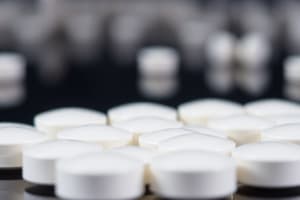Podcast
Questions and Answers
Which organ system is minimally affected by benzodiazepines?
Which organ system is minimally affected by benzodiazepines?
- Cerebral
- Muscular
- Cardiovascular (correct)
- Respiratory
What effect do benzodiazepines have on blood pressure?
What effect do benzodiazepines have on blood pressure?
- No effect
- Increase
- Decrease (correct)
- Fluctuate
Which organ system do benzodiazepines primarily affect in terms of reducing oxygen consumption?
Which organ system do benzodiazepines primarily affect in terms of reducing oxygen consumption?
- Cardiovascular
- Cerebral (correct)
- Muscular
- Respiratory
What is the effect of benzodiazepines on the ventilatory response to CO2?
What is the effect of benzodiazepines on the ventilatory response to CO2?
When can benzodiazepines cause respiratory arrest?
When can benzodiazepines cause respiratory arrest?
What is the primary effect of benzodiazepines on intracranial pressure?
What is the primary effect of benzodiazepines on intracranial pressure?
What type of seizures are benzodiazepines effective in controlling?
What type of seizures are benzodiazepines effective in controlling?
What side effect is commonly associated with sedative doses of benzodiazepines?
What side effect is commonly associated with sedative doses of benzodiazepines?
Where is the mild muscle relaxation property of benzodiazepines mediated?
Where is the mild muscle relaxation property of benzodiazepines mediated?
How do benzodiazepines affect the rate of unconsciousness and recovery?
How do benzodiazepines affect the rate of unconsciousness and recovery?
Which part of the brain does barbiturates depress?
Which part of the brain does barbiturates depress?
What is the main mechanism of action of barbiturates?
What is the main mechanism of action of barbiturates?
What determines the hypnotic potency and anticonvulsant activity of barbiturates?
What determines the hypnotic potency and anticonvulsant activity of barbiturates?
Which group of barbiturates is anticonvulsant?
Which group of barbiturates is anticonvulsant?
Which barbiturate is useful for providing anesthesia during electroconvulsive therapy?
Which barbiturate is useful for providing anesthesia during electroconvulsive therapy?
What effect does replacing oxygen with sulfur at C2 have on barbiturates?
What effect does replacing oxygen with sulfur at C2 have on barbiturates?
What determines the duration of induction doses of thiopental, thiamylal, and methohexital?
What determines the duration of induction doses of thiopental, thiamylal, and methohexital?
What explains the rapid cerebral absorption of thiopental?
What explains the rapid cerebral absorption of thiopental?
Under what conditions will higher concentrations of barbiturates be reached in the brain and heart?
Under what conditions will higher concentrations of barbiturates be reached in the brain and heart?
How long does it take for plasma and brain concentrations of barbiturates to reduce to 10% of maximum levels?
How long does it take for plasma and brain concentrations of barbiturates to reduce to 10% of maximum levels?
Which organ is responsible for the renal excretion of most agents?
Which organ is responsible for the renal excretion of most agents?
What effect do barbiturates have on blood pressure and heart rate?
What effect do barbiturates have on blood pressure and heart rate?
Which center in the brain do barbiturates depress, leading to a decrease in the ventilatory response?
Which center in the brain do barbiturates depress, leading to a decrease in the ventilatory response?
What effect do barbiturates have on cerebral blood flow and intracranial pressure?
What effect do barbiturates have on cerebral blood flow and intracranial pressure?
How do barbiturates affect renal blood flow and glomerular filtration rate?
How do barbiturates affect renal blood flow and glomerular filtration rate?
What effect do barbiturates have on hepatic blood flow?
What effect do barbiturates have on hepatic blood flow?
Which enzyme system do barbiturates interfere with, affecting the biotransformation of other drugs?
Which enzyme system do barbiturates interfere with, affecting the biotransformation of other drugs?
Which receptor do benzodiazepines bind to in the central nervous system?
Which receptor do benzodiazepines bind to in the central nervous system?
What is the specific benzodiazepine receptor antagonist?
What is the specific benzodiazepine receptor antagonist?
Which benzodiazepine has water solubility at low pH due to its imidazole ring?
Which benzodiazepine has water solubility at low pH due to its imidazole ring?
Which organ system is minimally affected by benzodiazepines?
Which organ system is minimally affected by benzodiazepines?
What effect do benzodiazepines have on blood pressure?
What effect do benzodiazepines have on blood pressure?
When do benzodiazepines cause significant respiratory depression?
When do benzodiazepines cause significant respiratory depression?
What effect do benzodiazepines have on cerebral oxygen consumption?
What effect do benzodiazepines have on cerebral oxygen consumption?
Which type of seizures are benzodiazepines effective in controlling?
Which type of seizures are benzodiazepines effective in controlling?
What property of benzodiazepines is mediated at the level of the spinal cord?
What property of benzodiazepines is mediated at the level of the spinal cord?
Do benzodiazepines have a faster or slower rate of unconsciousness compared to other drugs?
Do benzodiazepines have a faster or slower rate of unconsciousness compared to other drugs?
Which organ system do benzodiazepines have the greatest effect on?
Which organ system do benzodiazepines have the greatest effect on?
What effect do benzodiazepines have on intracranial pressure?
What effect do benzodiazepines have on intracranial pressure?
What is a common side effect of sedative doses of benzodiazepines?
What is a common side effect of sedative doses of benzodiazepines?
Which receptor do barbiturates bind to in the brain?
Which receptor do barbiturates bind to in the brain?
What is the main mechanism of action of barbiturates?
What is the main mechanism of action of barbiturates?
What determines the hypnotic potency and anticonvulsant activity of barbiturates?
What determines the hypnotic potency and anticonvulsant activity of barbiturates?
Which barbiturate is specifically useful for providing anesthesia during electroconvulsive therapy?
Which barbiturate is specifically useful for providing anesthesia during electroconvulsive therapy?
What happens when the oxygen at C2 in barbiturates is replaced with a sulfur atom?
What happens when the oxygen at C2 in barbiturates is replaced with a sulfur atom?
Which barbiturate has the greatest potency, rapid onset of action, and shorter duration of action after a single dose?
Which barbiturate has the greatest potency, rapid onset of action, and shorter duration of action after a single dose?
What determines the duration of induction doses of thiopental, thiamylal, and methohexital?
What determines the duration of induction doses of thiopental, thiamylal, and methohexital?
What explains the rapid cerebral absorption of thiopental?
What explains the rapid cerebral absorption of thiopental?
Under what conditions will higher concentrations of barbiturates be reached in the brain and heart for a given dose?
Under what conditions will higher concentrations of barbiturates be reached in the brain and heart for a given dose?
Within how many minutes do plasma and brain concentrations of barbiturates reduce to 10% of maximum levels due to redistribution?
Within how many minutes do plasma and brain concentrations of barbiturates reduce to 10% of maximum levels due to redistribution?
Which of the following statements about renal excretion is correct?
Which of the following statements about renal excretion is correct?
What effect do barbiturates have on the cardiovascular system?
What effect do barbiturates have on the cardiovascular system?
How do barbiturates affect the respiratory system?
How do barbiturates affect the respiratory system?
What effect do barbiturates have on the cerebral vasculature?
What effect do barbiturates have on the cerebral vasculature?
How do barbiturates affect renal blood flow and glomerular filtration rate?
How do barbiturates affect renal blood flow and glomerular filtration rate?
What effect do barbiturates have on hepatic blood flow?
What effect do barbiturates have on hepatic blood flow?
What effect does chronic exposure to barbiturates have on liver enzymes?
What effect does chronic exposure to barbiturates have on liver enzymes?
What effect do barbiturates have on the binding of other drugs to the cytochrome P-450 enzyme system?
What effect do barbiturates have on the binding of other drugs to the cytochrome P-450 enzyme system?
What effect do benzodiazepines have on the GABAa receptor?
What effect do benzodiazepines have on the GABAa receptor?
Which of the following is a potential effect of propofol infusion in critically ill children or young adult neurosurgical patients?
Which of the following is a potential effect of propofol infusion in critically ill children or young adult neurosurgical patients?
What is the main cardiovascular effect of propofol?
What is the main cardiovascular effect of propofol?
Which factors are associated with propofol-induced hypotension?
Which factors are associated with propofol-induced hypotension?
What is the respiratory effect of propofol?
What is the respiratory effect of propofol?
What effect does propofol have on the hypoxic ventilatory drive?
What effect does propofol have on the hypoxic ventilatory drive?
What effect does propofol have on cerebral blood flow?
What effect does propofol have on cerebral blood flow?
What effect does propofol have on intracranial pressure?
What effect does propofol have on intracranial pressure?
Which organ system is minimally affected by propofol?
Which organ system is minimally affected by propofol?
What effect does propofol have on the normal arterial baroreflex response to hypotension?
What effect does propofol have on the normal arterial baroreflex response to hypotension?
Who should administer propofol for sedation?
Who should administer propofol for sedation?
Which of the following is a contraindication for the administration of ketamine?
Which of the following is a contraindication for the administration of ketamine?
What effect does sympathetic blockade have on the myocardial depressant effects of large doses of ketamine?
What effect does sympathetic blockade have on the myocardial depressant effects of large doses of ketamine?
Which combination can produce apnea when administered with ketamine?
Which combination can produce apnea when administered with ketamine?
Which type of patients may require intubation during general anesthesia with ketamine?
Which type of patients may require intubation during general anesthesia with ketamine?
What is the effect of racemic ketamine on bronchodilation?
What is the effect of racemic ketamine on bronchodilation?
When combined with a benzodiazepine and controlled ventilation, what effect does ketamine have on intracranial pressure?
When combined with a benzodiazepine and controlled ventilation, what effect does ketamine have on intracranial pressure?
Which receptor does etomidate bind to in the central nervous system?
Which receptor does etomidate bind to in the central nervous system?
What is the primary use of etomidate?
What is the primary use of etomidate?
What effect does etomidate have on peripheral vascular resistance?
What effect does etomidate have on peripheral vascular resistance?
What effect does etomidate have on cerebral blood flow?
What effect does etomidate have on cerebral blood flow?
Which of the following is a known effect of ketamine on the central nervous system?
Which of the following is a known effect of ketamine on the central nervous system?
What is the controversial aspect regarding ketamine's mechanism of producing anesthesia or analgesia?
What is the controversial aspect regarding ketamine's mechanism of producing anesthesia or analgesia?
In which condition is ketamine widely used to treat severe treatment-resistant depression?
In which condition is ketamine widely used to treat severe treatment-resistant depression?
For what purpose are small doses of ketamine infusion used during and after surgical procedures?
For what purpose are small doses of ketamine infusion used during and after surgical procedures?
In which situation is ketamine useful for intramuscular induction of general anesthesia?
In which situation is ketamine useful for intramuscular induction of general anesthesia?
With which agents can ketamine be combined for conscious sedation during procedures such as nerve blocks and endoscopy?
With which agents can ketamine be combined for conscious sedation during procedures such as nerve blocks and endoscopy?
What effect does ketamine have on the sympathetic nervous system and norepinephrine reuptake?
What effect does ketamine have on the sympathetic nervous system and norepinephrine reuptake?
What are the cardiovascular changes that accompany the indirect cardiovascular effects of ketamine?
What are the cardiovascular changes that accompany the indirect cardiovascular effects of ketamine?
What is the primary effect of ketamine on organ systems?
What is the primary effect of ketamine on organ systems?
In which setting is ketamine's tendency to produce sympathetic stimulation useful for intravenous induction of anesthesia?
In which setting is ketamine's tendency to produce sympathetic stimulation useful for intravenous induction of anesthesia?
Which opioid receptor is responsible for supraspinal analgesia?
Which opioid receptor is responsible for supraspinal analgesia?
Which opioid receptor is associated with respiratory depression?
Which opioid receptor is associated with respiratory depression?
Which opioid receptor is responsible for sedation?
Which opioid receptor is responsible for sedation?
Which opioid receptor is associated with dysphoria and hallucinations?
Which opioid receptor is associated with dysphoria and hallucinations?
Which opioid receptor is responsible for analgesia?
Which opioid receptor is responsible for analgesia?
Which opioid receptor is associated with muscular stiffness?
Which opioid receptor is associated with muscular stiffness?
Which opioid receptor is responsible for respiratory stimulation?
Which opioid receptor is responsible for respiratory stimulation?
Which opioid receptor is associated with epileptic behavior?
Which opioid receptor is associated with epileptic behavior?
Which opioid receptor is responsible for spinal analgesia?
Which opioid receptor is responsible for spinal analgesia?
Which opioid receptor is associated with physical dependency?
Which opioid receptor is associated with physical dependency?
Which receptor do opioids bind to in the respiratory centers of the brainstem?
Which receptor do opioids bind to in the respiratory centers of the brainstem?
What is the effect of opioids on respiratory rate?
What is the effect of opioids on respiratory rate?
What is the role of respiratory rate and end-tidal CO2 tension in detecting respiratory depression in patients receiving opioid analgesia?
What is the role of respiratory rate and end-tidal CO2 tension in detecting respiratory depression in patients receiving opioid analgesia?
What happens to the CO2 response curve as a result of opioids binding to neurons in the respiratory centers of the brainstem?
What happens to the CO2 response curve as a result of opioids binding to neurons in the respiratory centers of the brainstem?
What effect do opioids have on the apneic threshold?
What effect do opioids have on the apneic threshold?
Which opioids can induce chest wall stiffness severe enough to make bag-mask ventilation nearly impossible?
Which opioids can induce chest wall stiffness severe enough to make bag-mask ventilation nearly impossible?
What effect do opioids have on cerebral blood flow and intracranial pressure compared to propofol, benzodiazepines, or barbiturates?
What effect do opioids have on cerebral blood flow and intracranial pressure compared to propofol, benzodiazepines, or barbiturates?
What effect do opioids have on gastrointestinal motility?
What effect do opioids have on gastrointestinal motility?
Which opioid-induced condition can mimic a common bile duct stone on cholangiography?
Which opioid-induced condition can mimic a common bile duct stone on cholangiography?
Which hormones are inhibited more completely by large doses of fentanyl or sufentanil compared to volatile anesthetics?
Which hormones are inhibited more completely by large doses of fentanyl or sufentanil compared to volatile anesthetics?
Flashcards are hidden until you start studying
Study Notes
Organ System Effects of Benzodiazepines
- The organ system minimally affected by benzodiazepines is the cardiovascular system.
- Benzodiazepines generally do not cause significant changes in blood pressure.
- Benzodiazepines primarily affect the central nervous system, reducing oxygen consumption.
- Benzodiazepines suppress the ventilatory response to CO2.
- Respiratory arrest can occur with benzodiazepines, particularly when combined with other respiratory depressants or in individuals with pre-existing respiratory compromise.
- Benzodiazepines have a minimal effect on intracranial pressure.
- Benzodiazepines are effective in controlling tonic-clonic seizures (grand mal seizures).
- Sedative doses of benzodiazepines are commonly associated with anterograde amnesia (difficulty forming new memories).
- The mild muscle relaxation property of benzodiazepines is mediated at the spinal cord level.
- Benzodiazepines have a relatively slower rate of unconsciousness compared to other drugs.
- Benzodiazepines have the greatest effect on the central nervous system.
- Benzodiazepines do not significantly increase intracranial pressure.
Barbiturates: Mechanism of Action and Effects
- Barbiturates bind to the GABAa receptor in the brain.
- The main mechanism of action of barbiturates is to enhance the inhibitory effects of GABA, a neurotransmitter, leading to CNS depression.
- Hypnotic potency and anticonvulsant activity of barbiturates are determined by their lipid solubility and the duration of their action.
- Short-acting barbiturates like pentobarbital and secobarbital are anticonvulsant.
- Methohexital is a barbiturate used for providing anesthesia during electroconvulsive therapy (ECT).
- Replacing oxygen with sulfur at C2 in barbiturates increases lipid solubility and reduces duration of action.
- The duration of induction doses of thiopental, thiamylal, and methohexital is determined by their redistribution from the brain to other tissues.
- The rapid cerebral absorption of thiopental is explained by its high lipid solubility.
- Higher concentrations of barbiturates are reached in the brain and heart under conditions of increased blood flow to these organs.
- Plasma and brain concentrations of barbiturates reduce to 10% of maximum levels within 1-2 hours due to redistribution to other tissues.
- The kidneys are responsible for the renal excretion of most agents.
- Barbiturates have minimal effects on blood pressure and heart rate.
- Barbiturates depress the respiratory center in the brainstem, leading to a decrease in the ventilatory response to CO2.
- Barbiturates increase cerebral blood flow and intracranial pressure.
- Barbiturates reduce renal blood flow and glomerular filtration rate.
- Barbiturates decrease hepatic blood flow.
- Barbiturates interfere with the cytochrome P-450 enzyme system, potentially affecting the biotransformation of other drugs.
Benzodiazepine Receptor Interactions
- Benzodiazepines bind to the GABAa receptor in the central nervous system.
- Flumazenil is the specific benzodiazepine receptor antagonist.
- Midazolam has water solubility at low pH due to its imidazole ring.
Propofol Mechanism of Action and Effects
- Propofol binds to the GABAa receptor and enhances the inhibitory effects of GABA.
- Propofol infusion in critically ill children or young adult neurosurgical patients can potentially cause propofol infusion syndrome, a rare but serious condition characterized by metabolic acidosis, rhabdomyolysis, hyperlipidemia, and cardiac dysfunction.
- Propofol primarily causes cardiovascular depression, leading to hypotension.
- Propofol-induced hypotension is associated with factors such as hypovolemia, preexisting cardiovascular compromise, and rapid infusions.
- Propofol has a dose-dependent respiratory depressant effect.
- Propofol reduces the hypoxic ventilatory drive, which can be problematic in patients with respiratory compromise.
- Propofol decreases cerebral blood flow and intracranial pressure.
- The organ system minimally affected by propofol is the cardiovascular system, with minimal effect on heart rate, contractility, and stroke volume.
- Propofol alters the normal arterial baroreflex response to hypotension, potentially leading to paradoxical hypertension.
- Propofol for sedation should only be administered by healthcare professionals with appropriate training and expertise.
Ketamine Mechanism of Action and Effects
- Ketamine is a noncompetitive antagonist of the N-methyl-D-aspartate (NMDA) receptor.
- Ketamine is primarily used for induction and maintenance of anesthesia, particularly in pediatric patients.
- Ketamine causes a decrease in peripheral vascular resistance, leading to hypotension.
- Ketamine increases cerebral blood flow.
- Ketamine's effects on the central nervous system include dissociative anesthesia, analgesia, and a unique psychotomimetic effect.
- The controversial aspect of ketamine's mechanism is that it can produce both anesthesia and analgesia through different mechanisms.
- Ketamine is widely used to treat severe treatment-resistant depression.
- Small doses of ketamine infusion are used during and after surgical procedures for perioperative pain management and prevention of postoperative nausea and vomiting.
- Ketamine is useful for intramuscular induction of general anesthesia in situations where intravenous access is difficult or unavailable.
- Ketamine can be combined with benzodiazepines for conscious sedation during procedures like nerve blocks and endoscopy.
- Ketamine stimulates the sympathetic nervous system, increasing heart rate and blood pressure.
- Ketamine inhibits norepinephrine reuptake, further enhancing sympathetic activity.
- The cardiovascular changes accompanying ketamine's indirect effects include tachycardia, increased cardiac output, and peripheral vasodilation.
- Ketamine's primary effect is on the central nervous system, producing analgesia, amnesia, and sedation.
- Ketamine's tendency to produce sympathetic stimulation is useful for intravenous induction of anesthesia, making it particularly beneficial in patients with low blood pressure or hemodynamic instability.
Opioid Receptor Interactions
- The mu opioid receptor (µOR) is responsible for supraspinal analgesia and respiratory depression.
- The delta opioid receptor (δOR) is associated with sedation.
- The kappa opioid receptor (κOR) is associated with dysphoria and hallucinations.
- The mu opioid receptor (µOR) is responsible for analgesia.
- The mu opioid receptor (µOR) is associated with muscular stiffness.
- The sigma opioid receptor (σOR) is responsible for respiratory stimulation.
- The epsilon opioid receptor (εOR) is associated with epileptic behavior.
- The delta opioid receptor (δOR) is responsible for spinal analgesia.
- The mu opioid receptor (µOR) is associated with physical dependency.
- Opioids bind to receptors in the respiratory centers of the brainstem, leading to respiratory depression.
Studying That Suits You
Use AI to generate personalized quizzes and flashcards to suit your learning preferences.





